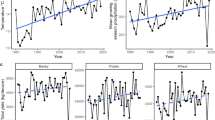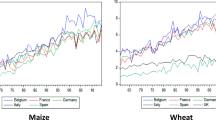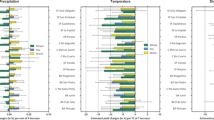Abstract
Numerous studies have addressed climate change's impact on agriculture, yet the specific effects on wheat production in Turkey remain under-explored. This research aims to bridge this gap by quantifying these impacts in Turkey over 25 years. As the region's principal wheat producer, Turkey offers a unique context, situated in the area where wheat was first domesticated. We analyzed a comprehensive dataset comprising over 20,000 records from 820 political districts, employing a panel data fixed-effect model to mitigate unobserved heterogeneity and reveal dynamic time-related patterns. We focused on critical climate variables: temperature, precipitation, and drought. The results show a significant 9% decrease in wheat yields following a 1.5 °C rise in temperature, affecting nearly 1 million hectares. A notable finding is the 'May effect', highlighting how climatic changes in May disproportionately affect wheat yields. This study provides detailed insights into the temporal and geographic aspects of climate change's impact on wheat production, emphasizing the need for targeted policy actions and strategic agricultural planning, particularly in dry areas.

Similar content being viewed by others
Data availability
The majority of datasets utilized in this study are publicly accessible. District-level wheat production data until 2004 and price variable data are available at TurkStat’s website (https://www.tuik.gov.tr/). A supplementary dataset from TurkStat was obtained for the periods preceding 2004. Climate variables were derived from the Climate Research Unit’s high-resolution gridded datasets (https://crudata.uea.ac.uk/cru/data/hrg/). Drought variables were extracted from the CEDA Archive (https://dx.doi.org/https://doi.org/10.5285/ac43da11867243a1bb414e1637802dec) and the Global SPEI database (https://spei.csic.es/database.html).
Notes
We checked the cited paper (Harris et al. 2020) of the dataset on Web of Science. Even though it was a recent paper, it had more than 1500 citations on November 2023.
We also considering the other three estimates in the Gebrechorkos et al. (2023), the results were similar and are available from the authors upon the request.
In addition to the twelve-month SPEI, we also calculated our drought model using six-month SPEI values. The results were similar and are available from the authors upon the request.
See Fig. 1 for a general overview of the methodological flow of the paper.
We also estimated the non-linear model using the squares of temperature and precipitation variables. The coefficients of the non-linear variables were not different than zero in terms of magnitude or statistical significance. The results are available from the authors upon request.
The temperature coefficient in the column 1 of Table 5 is -0.066, while the interaction variable coefficient is 0.062.
References
Agnolucci P, Rapti C, Alexander P, De Lipsis V, Holland RA et al (2020) Impacts of rising temperatures and farm management practices on global yields of 18 crops. Nat Food 1(9):562–571. https://doi.org/10.1038/s43016-020-00148-x
Aragón FM, Oteiza F, Rud JP (2021) Climate Change and Agriculture: Subsistence Farmers’ Response to Extreme Heat. Am Econ J Econ Pol 13(1):1–35. https://doi.org/10.1257/pol.20190316
Arora G, Feng HL, Anderson CJ, Hennessy DA (2020) Evidence of climate change impacts on crop comparative advantage and land use [Article]. Agric Econ 51(2):221–236. https://doi.org/10.1111/agec.12551
Asseng S, Ewert F, Martre P, Rotter RP, Lobell DB et al (2015) Rising temperatures reduce global wheat production. Nat Clim Change 5(2):143–147. https://doi.org/10.1038/Nclimate2470
Asseng S, Ewert F, Rosenzweig C, Jones JW, Hatfield JL et al (2013) Uncertainty in simulating wheat yields under climate change. Nat Clim Change 3(9):827–832. https://doi.org/10.1038/Nclimate1916
Bilgic H, Hakki EE, Pandey A, Khan MK, Akkaya MS (2016) Ancient DNA from 8400 year-old catalhoyuk wheat: implications for the origin of neolithic agriculture. PLoS ONE 11(3):e0151974. https://doi.org/10.1371/journal.pone.0151974
Burke M, Emerick K (2016) Adaptation to climate change: evidence from US Agriculture. Am Econ J-Econ Policy 8(3):106–140. https://doi.org/10.1257/pol.20130025
Carter C, Cui XM, Ghanem D, Merel P (2018) Identifying the economic impacts of climate change on agriculture. In: Rausser GC, Zilberman D (eds) Annual review of resource economics, vol 10, pp 361–380. Annual Reviews. https://doi.org/10.1146/annurev-resource-100517-022938
Ceballos-Sierra F, Dall’Erba S (2021) The effect of climate variability on Colombian coffee productivity: a dynamic panel model approach. Agric Syst 190:103126. https://doi.org/10.1016/j.agsy.2021.103126
Chen S, Gong BL (2021) Response and adaptation of agriculture to climate change: Evidence from China. J Dev Econ 148:102557. https://doi.org/10.1016/j.jdeveco.2020.102557
Cho SJ, McCarl BA (2017) Climate change influences on crop mix shifts in the United States. Sci Rep 7(1):40845. https://doi.org/10.1038/srep40845
Dasgupta P, Morton JF, Dodman D, Karapinar B, Meza F et al (2014) Rural areas. In: Field CB, Barros VR, Dokken DJ, Mach KJ, Mastrandrea MD, Bilir TE, Chatterjee M, Ebi KL, Estrada YO, Genova RC, Girma B, Kissel ES, Levy AN, MacCracken S, Mastrandrea PR, White LL (eds) Climate Change 2014: Impacts, Adaptation, and Vulnerability: Part A: Global and Sectoral Aspects. Contribution of Working Group II to the Fifth Assessment Report of the Intergovernmental Panel on Climate Change. Cambridge University Press
Defrance D, Delesalle E, Gubert F (2020) Is migration drought-induced in Mali?: an empirical analysis using panel data on Malian localities over the 1987–2009 period. Institut de recherche économiques et sociales
Dell M, Jones BF, Olken BA (2014) What do we learn from the weather? the new climate-economy literature. J Econ Lit 52(3):740–798. https://doi.org/10.1257/jel.52.3.740
Deschênes O, Greenstone M (2007) The economic impacts of climate change: evidence from agricultural output and random fluctuations in weather. Am Econ Rev 97(1):354–385. https://doi.org/10.1257/aer.97.1.354
Diamond J (1997) Agriculture - location, location, location: the first farmers. Science 278(5341):1243–1244. https://doi.org/10.1126/science.278.5341.1243
Diamond J (2002) Evolution, consequences and future of plant and animal domestication. Nature 418(6898):700–707. https://doi.org/10.1038/nature01019
FAOSTAT. (2021) Food and agriculture data. Retrieved 09.01.2021 from http://www.fao.org/faostat/en/
Fisher RA (1925) The influence of rainfall on the yield of wheat at Rothamsted. Philosophical transactions of the royal society of London. Series B, containing papers of a biological character 213:89–142. http://www.jstor.org/stable/92118
Gebrechorkos SH, Peng J, Dyer E, Miralles DG, Vicente-Serrano SM et al (2023) Global high-resolution drought indices for 1981–2022. Earth System Science Data. https://doi.org/10.5194/essd-15-5449-2023
Harris I, Osborn TJ, Jones P, Lister D (2020) Version 4 of the CRU TS monthly high-resolution gridded multivariate climate dataset. Sci Data 7(1):109. https://doi.org/10.1038/s41597-020-0453-3
Heun M, SchaferPregl R, Klawan D, Castagna R, Accerbi M, et al. (1997) Site of einkorn wheat domestication identified by DNA fingerprinting. Science 278(5341):1312–1314. https://doi.org/10.1126/science.278.5341.1312
IPCC (2021) Summary for policymakers. In: Climate change 2021: The physical science basis. contribution of working group I to the sixth assessment report of the intergovernmental panel on climate change. https://doi.org/10.1017/9781009157896.001
IPCC (2022) Impacts of 1.5°C global warming on natural and human systems. In: C. Intergovernmental panel on climate (ed) Global Warming of 1.5°C: IPCC Special report on impacts of global warming of 1.5°C above pre-industrial levels in context of strengthening response to climate change, sustainable development, and efforts to eradicate poverty, pp 175–312. Cambridge University Press. https://doi.org/10.1017/9781009157940.005
Kawasaki K, Uchida S (2016) Quality matters more than quantity: asymmetric temperature effects on crop yield and quality grade. Am J Agr Econ 98(4):1195–1209. https://doi.org/10.1093/ajae/aaw036
Liu B, Asseng S, Müller C, Ewert F, Elliott J et al (2016). Similar estimates of temperature impacts on global wheat yield by three independent methods. Nat Clim Change 6(12):1130–1136. https://doi.org/10.1038/nclimate3115
Lobell DB, Schlenker W, Costa-Roberts J (2011) Climate trends and global crop production since 1980. Science 333(6042):616–620. https://doi.org/10.1126/science.1204531
Lobell DB, Sibley A, Ortiz-Monasterio JI (2012) Extreme heat effects on wheat senescence in India. Nat Clim Chang 2(3):186–189. https://doi.org/10.1038/Nclimate1356
Miao RQ, Khanna M, Huang HX (2016) Responsiveness of crop yield and acreage to prices and climate. Am J Agr Econ 98(1):191–211. https://doi.org/10.1093/ajae/aav025
Moore FC, Lobell DB (2014) Adaptation potential of European agriculture in response to climate change. Nat Clim Chang 4(7):610–614. https://doi.org/10.1038/Nclimate2228
Nguyen CT, Scrimgeour F (2021) Measuring the impact of climate change on agriculture in Vietnam: a panel Ricardian analysis. Agric Econ. https://doi.org/10.1111/agec.12677
Official Gazette (2021) 2021 Yılında Yapılacak Tarımsal Desteklemeler ve 2022 Yılında Uygulanacak Gübre ve Sertifikalı Tohum Kullanım Desteklerine İlişkin Karar (Karar Sayısı: 4760) [Turkish]
Orazem PF, Miranowski JA (2017) A dynamic model of acreage allocation with general and crop-specific soil capital. In The Economics of Land Use, pp 39–49. Routledge. https://doi.org/10.4324/9781315240114
Özdoğan M (2011) Modeling the impacts of climate change on wheat yields in Northwestern Turkey. Agr Ecosyst Environ 141(1–2):1–12. https://doi.org/10.1016/j.agee.2011.02.001
Peña-Gallardo M, Vicente-Serrano SM, Domínguez-Castro F, Beguería S (2019) The impact of drought on the productivity of two rainfed crops in Spain. Nat Hazard 19(6):1215–1234. https://doi.org/10.5194/nhess-19-1215-2019
Shewry PR (2009) Wheat. J Exp Bot 60(6):1537–1553. https://doi.org/10.1093/jxb/erp058
Sloat LL, Davis SJ, Gerber JS, Moore FC, Ray DK, et al. (2020) Climate adaptation by crop migration. Nat Commun 11(1):1243. https://doi.org/10.1038/s41467-020-15076-4
Tack J, Barkley A, Nalley LL (2015) Effect of warming temperatures on US wheat yields. Proc Natl Acad Sci 112(22):6931–6936. https://doi.org/10.1073/pnas.1415181112
TurkStat (2021) Crop production statistics. Retrieved 09.01.2021 from https://biruni.tuik.gov.tr/medas/?kn=92&locale=en
Vicente-Serrano SM, Begueria S, Lopez-Moreno JI (2010) A multiscalar drought index sensitive to global warming: the standardized precipitation evapotranspiration index. J Clim 23(7):1696–1718. https://doi.org/10.1175/2009jcli2909.1
Vicente-Serrano SM, Van der Schrier G, Begueria S, Azorin-Molina C, Lopez-Moreno JI (2015) Contribution of precipitation and reference evapotranspiration to drought indices under different climates. J Hydrol 526:42–54. https://doi.org/10.1016/j.jhydrol.2014.11.025
Wang SS, Mo XG, Hu S, Liu SX, Liu ZJ (2018) Assessment of droughts and wheat yield loss on the North China Plain with an aggregate drought index (ADI) approach. Ecol Ind 87:107–116. https://doi.org/10.1016/j.ecolind.2017.12.047
Welch JR, Vincent JR, Auffhammer M, Moya PF, Dobermann A, et al. (2010) Rice yields in tropical/subtropical Asia exhibit large but opposing sensitivities to minimum and maximum temperatures. Proc Natl Acad Sci U S A 107(33):14562–14567. https://doi.org/10.1073/pnas.1001222107
WWF (2016) Türkiye'nin Buğday Atlası (Wheat Atlas of Turkey) [Turkish]. WWF-Turkey
Zhao C, Liu B, Piao S, Wang X, Lobell DB et al (2017) Temperature increase reduces global yields of major crops in four independent estimates. Proc Natl Acad Sci U S A 114(35):9326–9331. https://doi.org/10.1073/pnas.1701762114
Acknowledgements
We thank Hakan Ozkan from Cukurova University for his valuable feedback on this paper, Arap Diri from TurkStat and Serdar Ali from the Meteorological Service for their assistance with data collection.
Funding
Alper Demirdogen acknowledges the partial financial support for this research project from TUBITAK’s 2219 scholarship program.
Author information
Authors and Affiliations
Contributions
Alper Demirdogen: Conceptualization, original draft writing, methodology, data analysis, editing.
Baris Karapinar: Conceptualization, original draft writing, supervision, review, and editing.
Gökhan Özertan: Supervision, writing, review, and editing.
Corresponding author
Ethics declarations
Competing interest
The authors declare that they have no known competing financial interests or personal relationships that could be perceived as influencing the reported work in this paper.
Additional information
Communicated by Prajal Pradhan
Publisher's Note
Springer Nature remains neutral with regard to jurisdictional claims in published maps and institutional affiliations.
Supplementary Information
Below is the link to the electronic supplementary material.
Rights and permissions
Springer Nature or its licensor (e.g. a society or other partner) holds exclusive rights to this article under a publishing agreement with the author(s) or other rightsholder(s); author self-archiving of the accepted manuscript version of this article is solely governed by the terms of such publishing agreement and applicable law.
About this article
Cite this article
Demirdogen, A., Karapinar, B. & Özertan, G. The impact of climate change on wheat in Turkey. Reg Environ Change 24, 20 (2024). https://doi.org/10.1007/s10113-023-02172-6
Received:
Accepted:
Published:
DOI: https://doi.org/10.1007/s10113-023-02172-6




